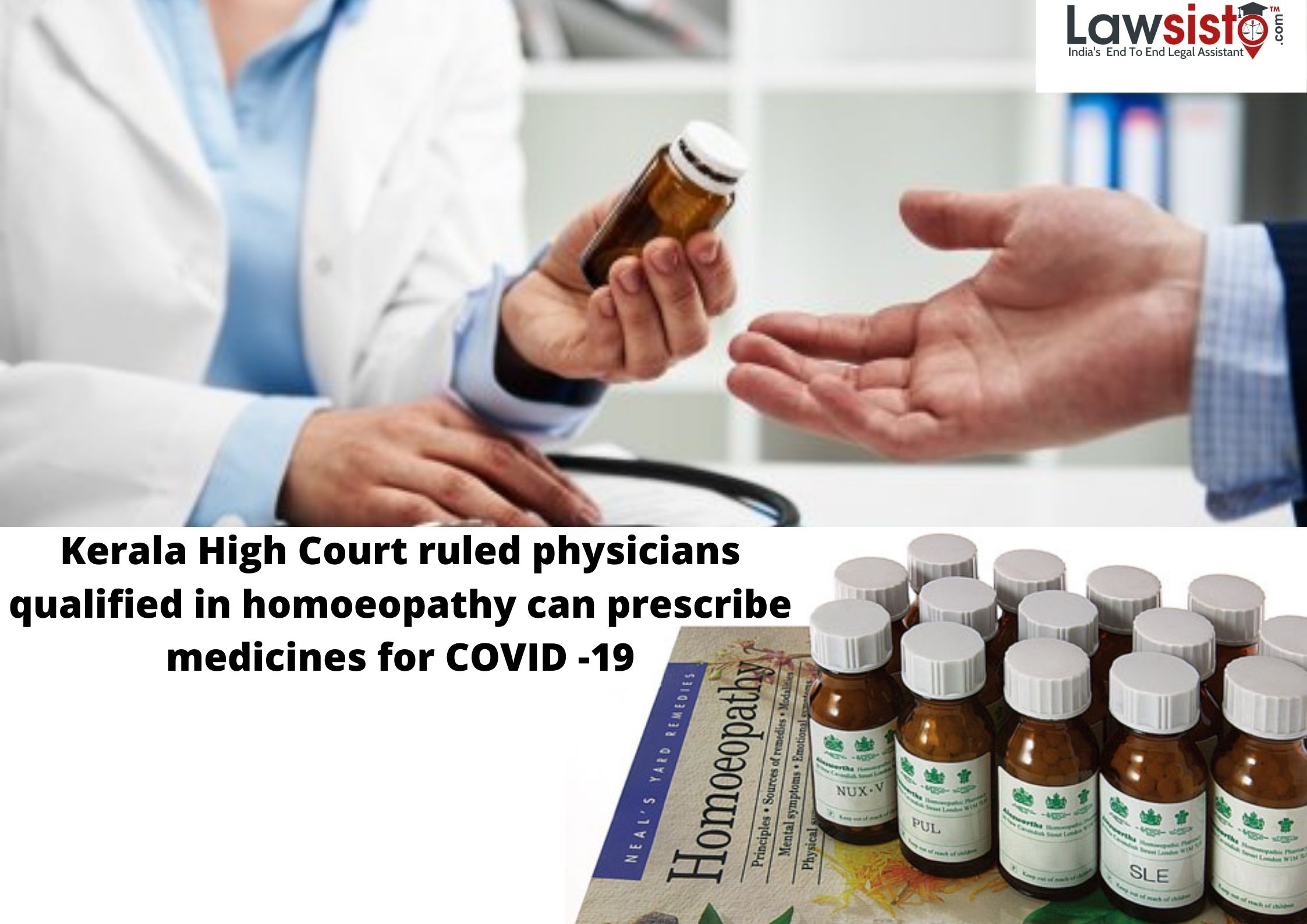Latest News
Kerala High Court ruled physicians qualified in homoeopathy can prescribe medicines for COVID -19

Kerala High Court ruled physicians qualified in homoeopathy can prescribe medicines for COVID -19
While hearing a civil writ petition the Kerala High Court on 2nd June ruled that the qualified homeopathy practitioners can prescribe medicines for combating COVID- 19.
FACTS OF THE CASE-
Dr. Jayaprasad Karunakaran, a well trained and experienced homeopathic practitioner pleaded before the court to grant a writ of Mandamus as he was restricted by the respondents (Union of India and State of Kerala) from doing the treatment of COVID-19 patients. The petitioner even contended that the officials of the State Health Department threatened him of taking action against him under the Disaster management Act after he attempted to treat COVID-19 patients at Thiruvanthapuram.
The appellant is a specialist in treating chronic illness including viral diseases. In fact on the basis of his skills and experience he has done treatment of serious COVID patients in the foreign countries and has successfully saved numerous lives.
PETITONER’S ARGUMENTS-
A learned counsel on behalf of petitioner, Sri V.T. Madhavanunni argued on the basis of recent judgment passed by the Supreme Court where it had sustained the rights of Homoeopathic Practitioners to treat COVID-19 patients. He condemned the invoking provisions of the Disaster Management Act as illegal and arbitrary. He further asserted that the action of the Government authorities were in violation of Article 19(1) (g) of the Constitution. Additionally he expressed the failure of Union Ministry in following and implementing the guidelines issued by Ministry of AYUSH (Ayurveda, Yoga and Naturopathy, Unani, Siddha and Homoeopathy) under Ext. P5.
RESPONDENT’S ARGUMENTS-
The learned Assistant Solicitor General of India, Sri P. Vijayakumar on the behalf of Union of India submitted that there is no hindrance from the end of Government of India regarding utilization of Homeopathy for treatment of COVID patients and reported that it is following Ministry of AYUSH recommendation issued under Ext.P2.
On the other hand the learned counsel on behalf of State of Kerala stated that an expert committee has been formed for chartering the protocols for treatment and management of COVID-19. The use of homeopathic medicines as prophylactic was approved. However, COVID-19 patients or their contacts or those people in quarantine were not intended to be included within this ambit
In view of the recent judgment of the Supreme Court, Government of Kerala modified its circular in which the qualified Homoeopathic Practitioners were advised to follow advisory and guidelines issued by the Ministry of AYUSH as well as orders issued by the Government of Kerala. However, homeopathic practitioners shall not make any claims regarding effectiveness of medicines prescribed.
ISSUES-
The main issue raised in this case was-
- To what extent can the homeopathic medical practitioners treat COVID-19 patients and prescribe medicines?
Statutory provision and circulars-
According to Section 34 of the National Commission of Homeopathy Act only the persons enrolled in the State Register or the National Register are permitted to practice Homoeopathy.
As per the Medical Protocol of State of Kerala regarding COVID-19 pandemic, the authorization of treating COVID-19 patients is limited to Government and government approved bodies.
However, nothing as such is mentioned in the protocol which proscribes the qualified medical AYUSH practitioners (including Homoeopathy Practitioners) to prescribe immunity booster mixture or tablets as recommended by the Ministry of AYUSH, Government of India.
In response to the circular issued by Ministry of AYUSH, the Government of Kerala issued GO (RT) on 8th April 2020 outlining Action Plan concerning COVID-19 prevention and mitigation. It positively applauded Ayurveda strategies but was silent on any action plan for Homoeopathy strategies for prevention, mitigation or rehabilitation of COVID-19 patients in Kerala. However, a few days later on 21st April 2021 in another notification approved the action plan outlining homoeopathy strategies for preventing and managing COVID-19 in Kerala. It listed down the details of strategy, setting up of communication platform, establishing necessary linkages, preparedness and readiness, implementation of the program and distribution of Homoeopathy Immune Booster. However, in the said action plan COVID-19 patients, their contacts or those under quarantine were excluded.
The Supreme Court had ruled in the similar case that homoeopathy practitioners can prescribe medicines as add on to conventional treatment without advertising and administering them as cure.
Court’s Decision-
After the detailed analysis of the guidelines issued by Ministry of AYUSH, Government of India, judgment of Supreme court and division bench of this court in the similar petition, Justice N. Nagaresh came to the conclusion stating-
- A physician qualified in homoeopathy can prescribe and dispense preventive and prophylactic homoeopathic medicines, for preventing Covid-19.
- The physicians can refer to Homoeopathy to combat symptoms of COVID-19 like illness.
- The Homeopathic physician may use homeopathy medicines as add on to the conventional cases of COVID-19. The court clearly noted that such prescription of the medicines must be as adjuvant to Standard Management Guidelines in the hospital setting along with the approval of authorities concerned and the consent of the patient/guardian.
- Considering Regulation specified under the Homoeopathic Practitioners (Professional Conduct, Etiquette and Code of Ethics) Regulations, 1982 read with Sections 33 and 24 of the Homoeopathic Central Council Act, 1973, the court completely put restriction on any sort of advertisement by Homeopathic physicians.
The court further granted relief to Dr. Jayaprasad Karunakaran by stating that it will ensure that the respondents shall not further restrict in any manner from practicing Homeopathy as per the guidelines issued by the Ministry of AYUSH, Government of India and the judgment of the Supreme Court.
Document:



































































































